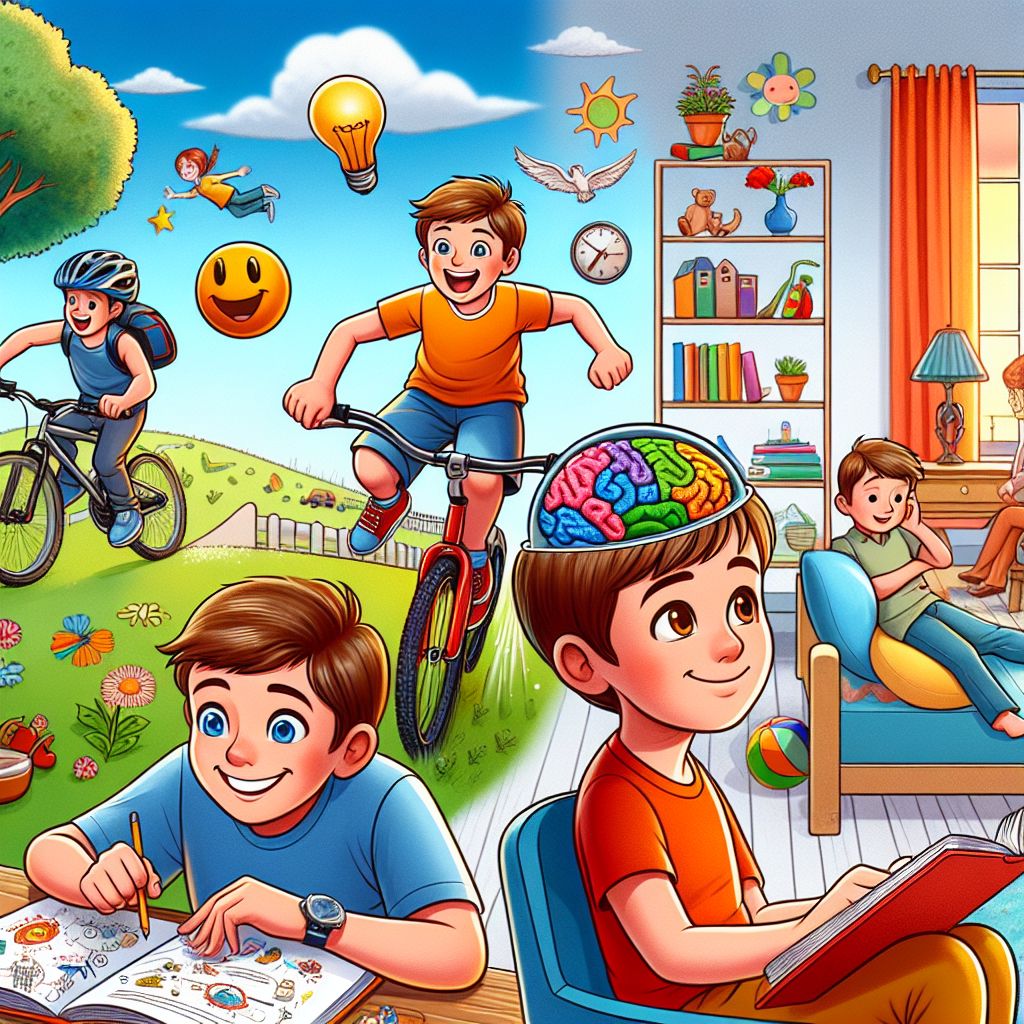-
Understanding the connection between good health and happiness in children is crucial.
-
Nutrition, exercise, and quality sleep are foundational to a child’s physical health.
-
Emotional resilience, cognitive development, and good self image contribute to mental well-being.
-
Social connections, supportive family relationships, and exploring values enhance a child’s spirit.
-
Integrating physical, mental, and spiritual health is key to raising happy, healthy children.

Good Health Is a Prerequisite for Happiness
When we talk about the health of our children, we’re looking at a tapestry woven with many threads—physical wellness, mental acuity, and emotional stability. Each aspect is as vital as the next, and all contribute to the overarching sensation of happiness in a child’s life. Let’s unravel this complexity and discover how to create a vibrant picture of health for our kids.
The Science Behind Health and Joy
Research tells us that there’s a strong link between the health of a child and their overall happiness. It’s not just about avoiding illness; it’s about fostering an environment that encourages vitality and joy. A child in good health is more likely to have the energy to play, the focus to learn, and the emotional balance to form positive relationships.
Promoting Positive Physical Health Routines
Good habits start young. By encouraging children to adopt healthy routines now, we lay the groundwork for a lifetime of well-being. This means regular physical activity, a balanced diet, and enough sleep—all of which are essential for growth and development, as well as for maintaining a sunny disposition.
Addressing Mental Health Early for Lifelong Benefits
Just as important as physical health, mental health in children deserves our full attention. By teaching our kids how to navigate their emotions and the challenges of life, we’re equipping them with tools that will serve them well into adulthood. Mental health awareness and support can lead to happier, more resilient individuals.
Health of Body
Nutrition: The Building Blocks for a Healthy Body
What we feed our children can influence not just their physical growth, but their mood and cognitive abilities too. A diet rich in fruits, vegetables, healthy fats, and non processed proteins provides the nutrients necessary for both body and brain development. Most importantly, it’s about creating a positive relationship with food that celebrates variety and balance.
Physical Activity: The Role of Exercise in Child Development
Children are designed to move! Exercise is not just for physical health; it’s also crucial for mental well-being. Regular physical activity helps children to build confidence, manage anxiety, and increase self-esteem. Plus, it’s a fantastic outlet for boundless energy and a proven way to improve mood.
Sleep: How Quality Rest Influences a Child’s Mood
Never underestimate the power of sleep. It’s during rest that children’s bodies grow and repair themselves. A good night’s sleep also helps with attention, learning, and emotional regulation. Make sure bedtime is a priority in your household—consistency and a calming bedtime routine can work wonders.
Emotional Resilience: Teaching Children to Cope with Challenges
Emotional resilience is the armor our children wear in the face of life’s challenges. It’s about equipping them with the ability to bounce back from setbacks and to approach problems with a positive outlook. We can foster this resilience by modeling healthy coping strategies, such as talking about our feelings, exercising, and engaging in activities that bring joy.
Moreover, resilience is not innate; it’s learned. By allowing children to experience manageable levels of stress and teaching them problem-solving skills, we help them develop the grit they’ll need to navigate life’s ups and downs. A resilient child is a happy child, one who knows that they can face and overcome adversity.
Cognitive Development: Stimulating a Child’s Intellect
Cognitive development is the expansion of a child’s ability to think and understand. It’s about creating a stimulating environment where curiosity is encouraged and learning is fun. Encourage your child to ask questions, to explore, and to engage with the world around them. This not only builds knowledge but also promotes happiness through a sense of achievement and discovery.
Peaceful Awareness and Relaxation Techniques for Children
In our fast-paced world, teaching children how to live in the present moment without worry and relaxation techniques is a gift that keeps on giving. Simple practices like deep breathing, simple prayers, or even child-friendly gentle flexibility stretching can help them manage stress and find inner peace. This sense of calm can greatly improve their overall happiness, making them more present and engaged in life.
Play and Creativity: Nurturing a Child’s Imagination
Play is the language of children. It is through play that they express themselves, learn new skills, and engage with others. Encouraging creative play not only nurtures a child’s imagination but also contributes to their emotional well-being. Whether it’s building a fort out of blankets or drawing a picture, creative activities allow children to explore their feelings and the world around them in a safe and enjoyable way.
Spirit
The spirit of a child is the essence of who they are. It is ultimately founded in awareness of God and hopefully a genuine relationship with God. It then has the potential to also encompass their social connections, their sense of belonging, and their understanding of themselves within the larger world. Nourishing a child’s spirit involves encouraging empathy, kindness, and a sense of community. It’s about helping them find their place in the world and understanding that they are a valuable part of it. But spiritual health hinges on the security of knowing that there is a God who loves them.
Social Connections: Fostering Friendships and Belonging
Humans are social creatures, and this is no less true for children. Fostering strong social connections is vital for a child’s happiness. Encourage your child to make friends, to share, and to cooperate with others. These social skills are key to developing a sense of belonging and community, which in turn contributes to their overall happiness.
“A friend is one of the nicest things you can have, and one of the best things you can be.” – Douglas Pagels
Remember, it’s not about the number of friends, but the quality of those friendships. Encourage depth and sincerity in their relationships.
Family Dynamics: The Role of Supportive Relationships
Family is the first social network a child knows. A supportive family environment is a springboard for health and happiness. Open communication, shared activities, and unconditional love within the family can significantly enhance a child’s sense of security and well-being.
-
Have regular family meals together without the distraction of technology.
-
Encourage open dialogue about any subject, making sure everyone feels heard.
-
Show affection and give praise freely to build confidence and a sense of worth.
A nurturing family environment lays the foundation for a child to venture into the world with confidence.
Values and Ethics: Guiding Children Toward a Fulfilling Life
Instilling strong values and ethics in children is about guiding them to understand right from wrong and to respect others. It’s about setting boundaries and expectations, not as a means of control, but as a way to help them navigate the complexities of life. When children have a strong moral compass, they are more likely to make choices that contribute to their happiness and the well-being of those around them.
Exploring Spirituality: Encouraging Wonder and Reflection in Children
Spirituality, regardless of religious beliefs, can offer a sense of connection and meaning that goes beyond the material world. Encouraging children to reflect, to appreciate the beauty of nature, and to wonder about the universe can foster a sense of peace and contentment. When children are encouraged to explore their spirituality, they often develop a deeper sense of purpose and happiness. But in this world of deception don’t expect your children to pick up spiritual truth by osmosis any more than they would pick up basic math skills. You need to teach them for them to know.
Here are some ways to encourage spirituality in children:
-
Share moments of quiet contemplation with your child, perhaps looking at the stars or sitting by the sea. These are moments when it is natural to talk about God’s love for them.
-
Discuss the big questions in life in an open and non-judgmental way.
-
Encourage acts of kindness and explain the joy that comes from helping others.
All Contribute to That Experience of Health
Good health in children is not just the absence of illness. It’s a holistic blend of a strong body, a resilient mind, and a nourished spirit. Each element feeds into the other, creating a synergy that is the essence of true happiness. A healthy child is one who is equipped to enjoy life to the fullest, to learn from every experience, and to grow into a well-rounded individual.
Integrating Physical, Mental, and Spiritual Health
Integrating the different aspects of health means understanding that they are all interconnected. A balanced diet and regular exercise will benefit a child’s mental state. Similarly, a peaceful mind will encourage better sleep patterns and a stronger immune system. And a strong sense of self and belonging will lead to healthier lifestyle choices. It’s all about creating a harmonious environment where each aspect of health supports the others.
Overcoming Barriers to a Healthy Lifestyle
Despite our best intentions, there can be barriers to maintaining a healthy lifestyle for our children. Time constraints, financial limitations, and a lack of resources can all pose challenges. However, it’s important to focus on what we can control and to make the best choices within our means. Simple changes, like incorporating more fruits and vegetables into meals, encouraging daily play, and setting aside time for family discussions, can make a significant difference.
Celebrating Milestones and Recognizing Growth
Every small step towards health and happiness should be celebrated. Recognizing and praising a child’s efforts to make healthy choices reinforces positive behavior and boosts their self-esteem. Celebrate the milestones, whether it’s trying a new vegetable, learning a new skill, or simply expressing their emotions in a healthy way. Acknowledgement goes a long way in encouraging continued growth. And remember that as you lay the foundation of good health, you lay the foundation for current and future happiness.
Stanley Lang, M.D. has been in active medical practice since 1978. He has been a family physician during these years with detailed experience in all age groups including delivering babies for several years. He has been a pioneer in developing models of wholistic health care that bring health to the whole person. He has particularly focussed on reversing Chronic Stress effects on the body. He is the creator of the Shalom Method for Wholistic Health, and he has created several online programs that allow patients to naturally self manage their problems including “The Natural Lyme disease Treatment Program”, the “Menopause Balancing Program”, “The Happy Healthy Child” program plus many others.



